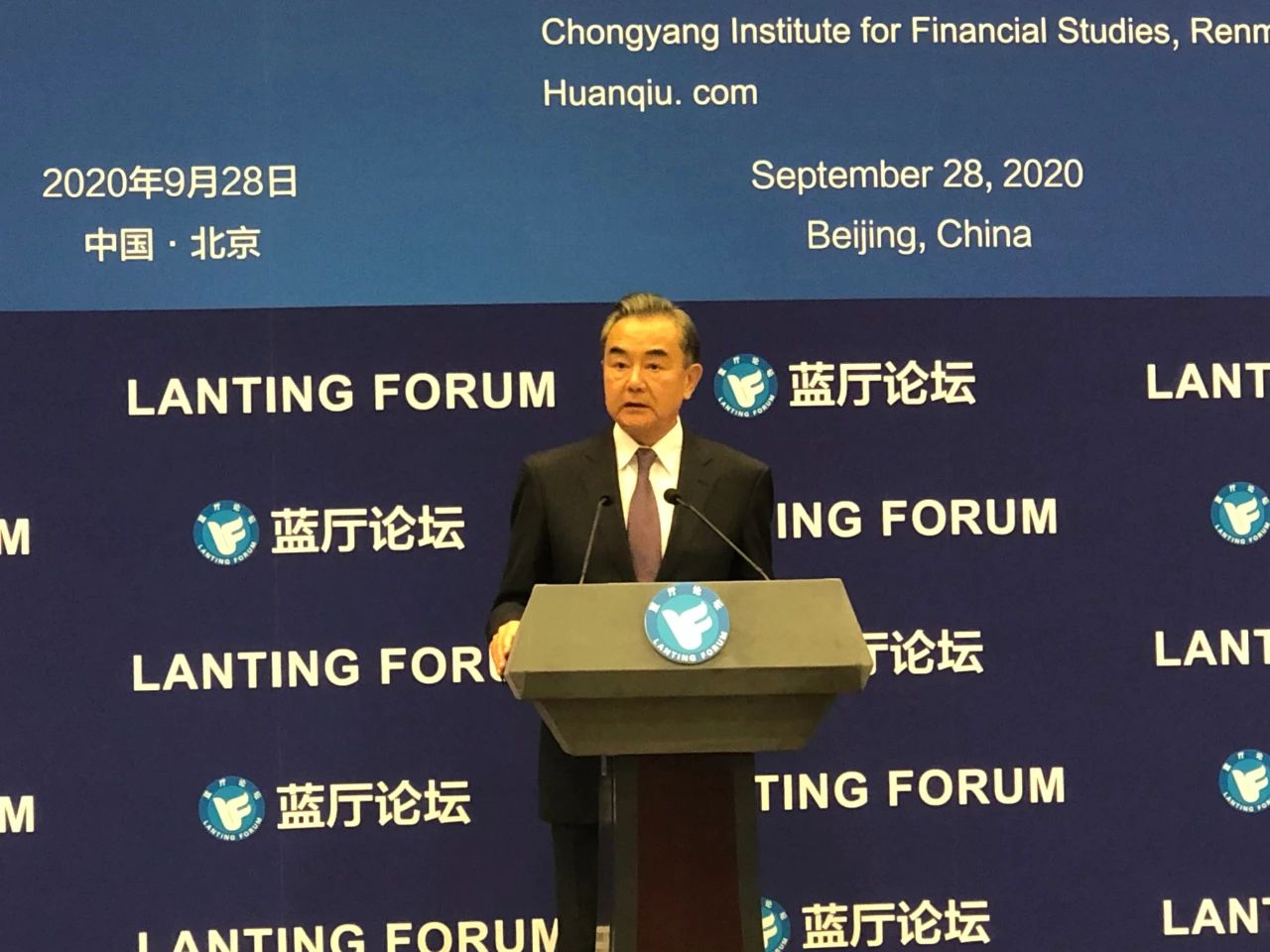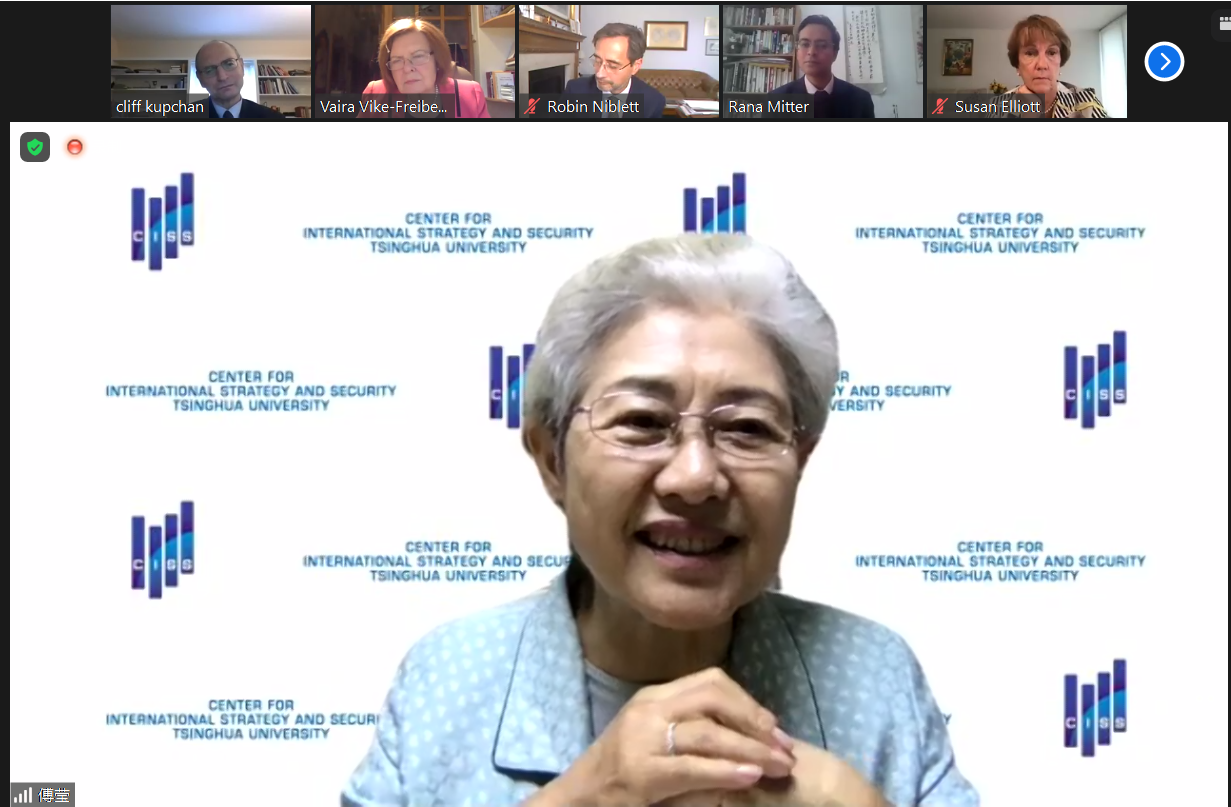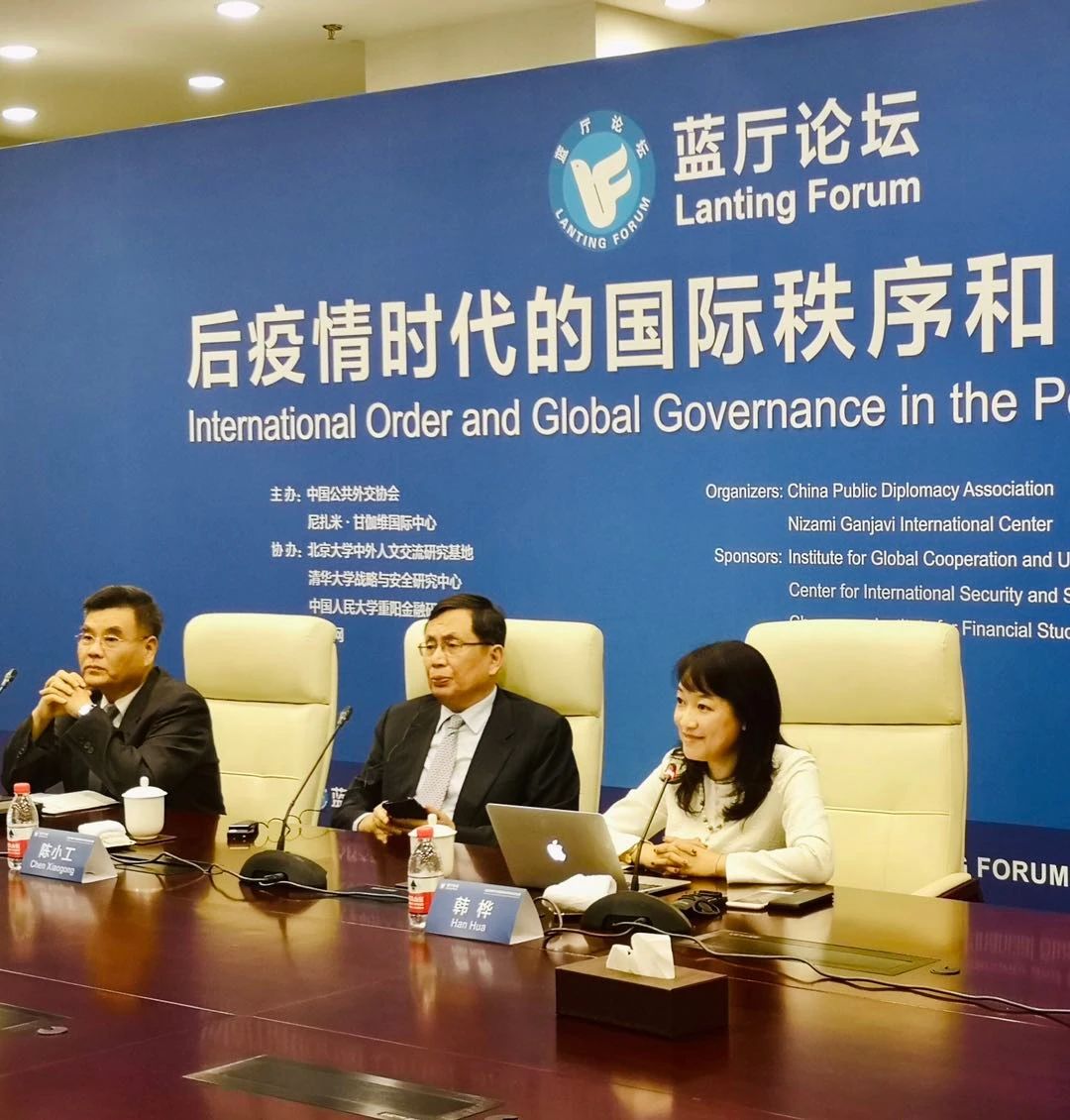On September 28, 2020, The Lanting Forum themed “International Order and Global Governance in the Post-COVID-19 Era” was held in Beijing. The event was organized by the China Public Diplomacy Association and Nizami Ganjavi International Center with sponsors including the Center for International Security and Strategy at Tsinghua University (CISS), Institute for Global Cooperation and Understanding at Peking University, Chongyang Institute for Financial Studies at Renmin University of China, and Huanqiu.com. H.E. Wang Yi, State Councilor and Foreign Minister, delivered a keynote speech at the opening ceremony. Former Japanese Prime Minister Yasuo Fukuda and former UN Secretary-General Ban Ki-moon also addressed the forum. Around 100 Chinese and foreign experts and scholars attended the event, including Dr. Margaret Chan, former WHO Director-General and Dean of the Vanke School of Public Health at Tsinghua University, and Mme. Fu Ying, Chair of CISS.
In his keynote speech, H.E. Wang Yi pointed out that the world is at another historic moment since World War II. The coronavirus keeps raging on; unilateral and bullying practices are rampant; and protectionism is on the rise. Where is our world headed in the post-COVID era? No country should take this question lightly, and more importantly, everyone should avoid making the wrong choice. In a world of profound changes, China will promote peace and development, defend the universal values of fairness and justice, move forward with solidarity, and keep to the direction of openness and cooperation. It will always shoulder its responsibilities as a major country, and take actions to deliver stability and certainty to this volatile world, and pump confidence and strength into the cause of multilateralism.

CISS hosted one of the Lanting Forum’s sub-forums themed “Global Governance and Multilateralism.” Its participants included Mme. Fu Ying, Chair of CISS, Susan M. Elliott, President of the National Committee on American Foreign Policy, Chen Xiaogong, former Deputy Director of the Central Foreign Affairs Commission and CISS Academic Committee Member, Dr. Robin Niblett CMG, Director of Chatham House, Cui Hongjian, Director of the Department for European Studies of China Institute of International Studies, Cliff Kupchan, Chairman of Eurasia Group, and Rana Mitter, Director of the University of Oxford China Center. The sub-forum provided a platform for a thorough exchange of views around the theme. Han Hua, Executive Committee Member of China Forum, CISS, served as the moderator.

In her keynote speech, Mme. Fu Ying believed that the most critical issue in the world today is how to deal with the coronavirus that is sweeping the world effectively. To lead our world out of this pandemic and the damage it caused, governments and the entire international community need to improve their public health governance. Diversity and symbiosis are one of the fundamental themes of multilateralism, said Mme. Fu Ying, and engagements and interdependence are the trend of our times. Relationships among major powers can only stay on track through mutually beneficial cooperation and fair competition. Balance is another tenet of multilateralism. Instead of “taking sides,” many small and medium-sized countries have adopted balanced diplomacy in the face of great-power competition, which features another characteristic of the times of multilateralism.
Mme. Fu Ying emphasized that multilateralism is the only viable way for the global community to explore new issues and challenges. The Chinese people believe in multilateralism and identify with it. We must be aware of what the people really care about. The agenda to improve global governance should rest on the belief to safeguard human security and focus on people’s livelihood, well-being and, development. This depends on whether countries will base their practices on the values of common security, cooperation and development.
It was broadly agreed at the sub-forum that despite the unprecedented challenges brought to multilateralism by the pandemic, it remains the most important way to solve the challenges of the 21st century. As voices questioning the effectiveness of multilateralism are emerging around the world, said Susan M. Elliott, international organizations urgently need member states to renew their commitments. As two major powers, the U.S. and China should shoulder imperative responsibilities and must support each other in the post-COVID era to lead the world out of this crisis. Other countries should also join hands to support the establishment and improvement of international norms and systems. Multilateralism will only work with the support of major powers. Chen Xiaogong pointed out that multilateralism is not a goal but a means; our goal is to formulate rules for the international community, and multilateralism is believed to be more acceptable to countries than unilateralism. Dr. Robin Niblett CMG believes that the UN-dominated, 20th-century global governance system no longer applies to the current landscape, and a more inclusive one is needed—one that is inclusive of international treaties, rules of law, and relatively independent and informal systems such as regional alliances, regional pioneers and subnational alliances. Cui Hongjian reckons that the world needs to work together to revive multilateralism and ensure global equality, resilience, and sustainability. The new multilateralism should be networked, multi-dimensional, inclusive, and adaptive to changes in the international landscape. Reviving such multilateralism requires a variety of paths and coordination among major powers. Cliff Kupchan believes that the U.S. and China are now in a bipolar system, which is more stable and predictable than a multipolar one, but will also significantly impact global governance and restrain multilateralism. Rana Mitter observed that the UN had made numerous contributions to meeting people's needs for peace and development over the past 75 years, and the next step for global governance is for countries to follow science, become more coordinated and transparent, learn from each other, and share with each other.

The Lanting Forum, initiated by the Ministry of Foreign Affairs of China, is a platform for communication and exchanges between government, businesses, academia, media, and the public. It aims to create a new channel to facilitate discussions on China’s foreign policies and other common interest issues. The Forum is named after Lanting (the Blue Hall) of the Ministry, where the event is held. In addition to the sub-forum themed “Global Governance and Multilateralism” hosted by CISS, this Lanting Forum also discussed such topics as “Economic Recovery and International Cooperation” and “Sustainable Development and Poverty Alleviation.”
